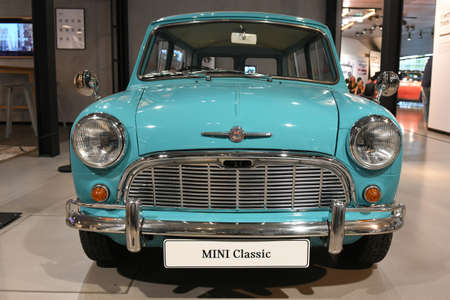Understanding Classic Car Insurance in the UK
When it comes to safeguarding your cherished vintage motor, classic car insurance is a world apart from standard vehicle cover. Unlike everyday cars, classic vehicles are not just modes of transport—they’re investments, passion projects, and pieces of automotive history. In the UK, insurers recognise this distinction and offer specialist policies tailored for enthusiasts and collectors. These policies often account for factors such as agreed value, limited mileage, and preservation needs that conventional car insurance simply overlooks. Understanding these unique features is the first step in ensuring your classic is protected appropriately and reflects its true worth. By opting for specialised classic car insurance, you gain access to expertise and terms designed specifically for the nuances of owning an older or historically significant vehicle—providing peace of mind whether your pride and joy is on the road or displayed at a show.
Assessing Provider Reputation and Financial Stability
When selecting a classic car insurance provider in the UK, it is crucial to thoroughly assess their reputation and financial stability. A reputable insurer not only offers peace of mind but also ensures reliable support when you need it most. Consider the following factors to make an informed decision:
Evaluating Reliability
Start by researching the company’s history within the UK market. Longevity can be an indicator of a stable business model and consistent customer satisfaction. Look for insurers that specialise in classic cars, as they are likely to better understand your vehicle’s unique requirements.
Customer Service Track Record
A provider’s approach to customer service reveals much about their reliability. Read independent reviews on platforms such as Trustpilot or Defaqto, and check if they have received any industry awards or recognitions. Pay attention to:
| Aspect | What to Check |
|---|---|
| Response Time | How quickly do they handle queries and claims? |
| Claims Process | Are customers satisfied with outcomes and support? |
| Communication | Is information clear, timely, and helpful? |
Assessing Financial Security
The financial health of your insurance provider is vital, particularly for long-term commitments like classic car cover. Investigate ratings from agencies such as Standard & Poor’s or Moody’s, which assess insurers’ ability to meet their obligations. Additionally, verify if the provider is authorised by the Financial Conduct Authority (FCA) and covered by the Financial Services Compensation Scheme (FSCS), ensuring protection if the company goes out of business.
Key Considerations for Financial Stability
- Credit Ratings: Opt for providers with strong credit scores.
- Regulatory Compliance: Confirm FCA authorisation.
- Compensation Scheme Coverage: Ensure FSCS protection.
By prioritising these elements when choosing your classic car insurance provider, you can safeguard both your prized vehicle and your own interests within the UK market.
![]()
3. Evaluating Policy Coverage Options
When comparing classic car insurance providers in the UK, it is crucial to scrutinise the available policy coverage options, as these can vary significantly between insurers. A few key features deserve particular attention for classic vehicle owners. One of the most important is agreed value cover, which ensures that you and your insurer have a pre-determined value for your vehicle, providing peace of mind that you will be compensated appropriately in the event of a total loss. Additionally, many enthusiasts appreciate the flexibility offered by limited mileage policies; these can result in lower premiums if you only drive your classic car occasionally, but it is vital to ensure the mileage limit suits your usage habits.
Another consideration is salvage rights. In the unfortunate event that your vehicle is written off, retaining salvage rights allows you to keep or buy back your car – an important point for those who may wish to restore or repurpose parts from their beloved vehicles. Furthermore, if your classic is a work in progress, check whether the insurer offers cover during restoration. Not all policies automatically protect cars while they are being restored or kept off-road, so this is a particularly relevant feature for ongoing projects.
Ultimately, taking time to thoroughly evaluate these aspects will help ensure that your chosen policy fits both your car’s needs and your own preferences as an owner. Always read policy documents carefully and don’t hesitate to ask potential providers about specific coverage options that matter most to classic car enthusiasts in the UK.
4. Checking Experience with Classic and Vintage Vehicles
When selecting a classic car insurance provider in the UK, one of the most crucial aspects to investigate is the insurer’s experience with classic and vintage vehicles. Unlike standard cars, classic cars—ranging from post-war British saloons to rare pre-war sports models—come with their own unique quirks, restoration needs, and market values. This means providers must have demonstrable expertise and a deep understanding of what makes these vehicles special within the British motoring context.
Providers with a proven track record are more likely to appreciate the nuances of British classics such as Austin Healeys, Jaguars, MGs, Bentleys, and Triumphs. Their knowledge impacts everything from accurate valuations to flexible repair options and appropriate policy features. Here’s how you can assess an insurer’s expertise:
| Criteria | What to Look For |
|---|---|
| Years in Business | Specialisation in classic/vintage insurance for at least 5-10 years |
| Range of Covered Vehicles | Experience insuring diverse British marques and eras (e.g., 1960s Minis, Edwardian tourers) |
| Claims Handling Track Record | Positive feedback from owners regarding claims for rare parts, restoration work or agreed value settlements |
| Affiliations and Partnerships | Collaboration with classic car clubs, restoration specialists or event sponsorships |
| Knowledgeable Staff | Staff who understand common issues such as corrosion in older Land Rovers or Lucas electrics in 1970s cars |
Choosing a provider with genuine know-how not only ensures peace of mind but can also make the difference between a smooth claim process and frustrating delays. In short, working with an insurer that truly understands Britain’s rich automotive heritage helps protect your investment and enhances your ownership experience.
5. Benefits and Perks Specific to UK Enthusiasts
When searching for the right classic car insurance provider in the UK, it’s wise to look beyond basic cover and examine the added extras tailored for British classic car enthusiasts. One key benefit often offered is access to club member discounts—many insurers partner with historic vehicle clubs, enabling their members to enjoy preferential rates and specialist advice. This fosters a sense of community support that resonates strongly within the UK’s vibrant classic car scene.
Another significant consideration is European cover. If you’re planning a road trip across the Channel or wish to attend continental rallies, check whether your policy provides seamless protection throughout Europe. Not all policies automatically include this, so confirm details like duration limits and specific country inclusions before setting off.
For those who regularly showcase their vehicles, show and event cover can be indispensable. This perk ensures your classic is protected while on display at exhibitions, concours d’elegance, or local meets—scenarios often excluded from standard motor insurance policies. It’s a feature highly valued by enthusiasts who take pride in sharing their vehicles with the public.
Lastly, breakdown assistance tailored for British roads is a critical extra. Given the unique challenges of driving classics—such as mechanical quirks and limited access to modern repair services—a provider offering dedicated breakdown recovery for older vehicles can make all the difference. Look for schemes that understand the needs of classic cars, such as specialist flatbed transport and mechanics familiar with vintage engineering.
Selecting an insurer that delivers these benefits not only safeguards your investment but also enhances your enjoyment as part of the UK’s classic motoring culture.
6. Understanding Exclusions and Policy Limitations
One of the most important aspects when selecting a classic car insurance provider in the UK is gaining a clear understanding of policy exclusions and limitations. Many enthusiasts focus on premiums and agreed values, but overlooking the small print can lead to costly surprises when making a claim.
Potential Pitfalls in Classic Car Policies
Classic car insurance policies often come with unique restrictions that differ significantly from standard motor insurance. Some providers may restrict cover based on age, mileage, or even storage conditions. For example, policies frequently stipulate that the vehicle must be stored in a locked garage overnight or may only be driven for social, domestic, and pleasure purposes – excluding commuting or business use. Failure to adhere to these conditions can invalidate your cover, leaving you exposed at the worst possible time.
Common Exclusions in the UK Market
The UK market sees several recurring exclusions that classic car owners should scrutinise before committing to a policy. These may include:
- Wear and Tear: Most insurers will not pay out for mechanical breakdowns or damage caused by general wear and tear, which is particularly relevant for older vehicles.
- Unapproved Modifications: Any modifications not declared and approved by the insurer could result in rejected claims, especially if they affect performance or safety.
- Participation in Competitive Events: Taking part in rallies, track days, or timed events is typically excluded unless specifically covered by an add-on or separate policy.
- Driver Restrictions: Some policies limit who can drive the vehicle, with clauses such as ‘named driver only’ or minimum age requirements for drivers.
UK-Specific Considerations
The UK’s weather conditions and road environment also play a part in policy limitations. Flood damage may not always be included as standard, especially if your postcode is considered high risk. Additionally, some insurers require classic cars to be SORN (Statutory Off Road Notification) during winter months if they are not being used, affecting year-round coverage.
Ultimately, reading through exclusions and discussing any grey areas with potential providers is essential. Ask direct questions about what is and isn’t covered—especially regarding parts availability, salvage retention rights, and restrictions on overseas travel. Being proactive at this stage could prevent heartache—and significant financial loss—later on.
7. Comparing Costs and Excess Levels
When it comes to selecting the right classic car insurance provider in the UK, one of the most crucial steps is evaluating the balance between premiums, voluntary excess, and overall value for money. While it may be tempting to focus solely on the lowest premium, it’s important to remember that cost is just one part of the equation. Consider how much you’re willing to pay out-of-pocket in the event of a claim—the voluntary excess. Increasing your voluntary excess can often reduce your annual premium, but be careful not to set it so high that it becomes unaffordable should you need to make a claim. It’s also worth scrutinising what’s included within each policy as standard, as some insurers may offer attractive rates but exclude features such as agreed value cover or salvage retention rights, which are particularly relevant for classic cars.
To ensure you’re getting genuine value for money, compare quotes from multiple providers using reputable comparison sites, but don’t be afraid to pick up the phone and speak directly with specialist brokers who understand the nuances of classic vehicles. They may be able to tailor a policy that better suits your needs or clarify any grey areas regarding excess levels and claim procedures. Finally, weigh up all aspects—premium amount, voluntary and compulsory excesses, additional benefits, and the insurer’s reputation—before making your final decision. By taking a pragmatic approach and considering both upfront and potential future costs, you’ll be well-placed to secure comprehensive protection for your cherished classic while keeping your finances in check.


